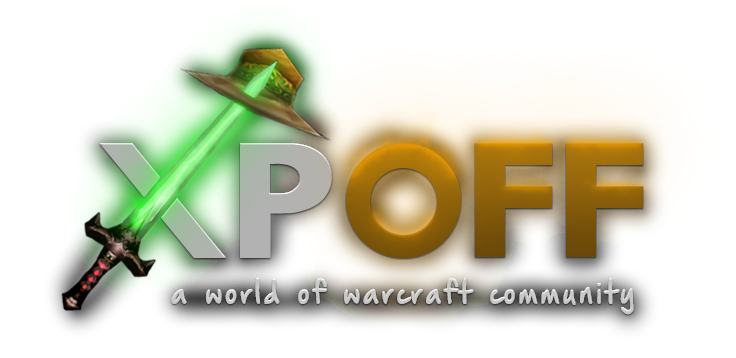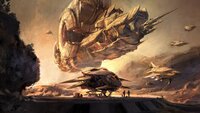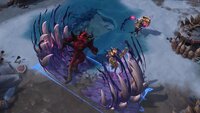Sin'dor
Veteran
Technically, this is only indirectly related to WoW... but I think it's "close-enough" to merit a highlight on this forum.
VG.24/7 has been covering the GameLab event in Barcelona, and got some great comments from retired Blizzard™ co-founder Mike Morhaime.
Unfortunately, they took what could have been a fascinating in-depth article and spread tiny pieces of it all over their cancerous site... so I figured that I'd "thank" them by consolidating it all here for the rest of you to enjoy.
If you've seen enough BlizzCon™ panels over the years, then this may not contain very many surprises... but it's still a pretty interesting read.
Blizzard might be one of gaming’s powerhouses, but it had modest beginnings.
Co-founder Mike Morhaime was studying electrical engineering at UCLA and when he met Allen Adham, another student who he became good friends with. The two of them, along with Frank Pearce, would go on to form Blizzard.
One day Adham and Morhaime were sitting in the computer lab when Adham had to print something off. In those days, the printer was on a different floor, so Adham locked his computer terminal and went off to retrieve his print out, leaving Morhaime alone in a room with a locked terminal.
“So now it’s just me sitting alone with this locked computer terminal next to me, and I noticed that after ten minutes it unlocked,” Morhaime explained during his GameLab talk. “So, I did what probably all of you would’ve done – I relocked it, typed in a different password, find a new password. I wanted to pick something that I wouldn’t forget because I figured I’d have to reveal it, and I wanted to pick something I’d never used before. So I picked ‘joe’. J-O-E lowercase.
“Allen comes back five minutes later, sits down and when he types in his password it unlocks. So, I’m like, ‘what happened?’ So I said, ‘Allen, how did you do that?’ He said, ‘Do what? I just typed in my password.’ I said, ‘What was your password?’ He said, ‘I’m not going to tell you that.’ I said, ‘Was it… “joe”?’ He said, ‘How did you know?’ Anyway, we laughed for like a half an hour, we just couldn’t believe that that had happened, and became very good friends.”
From there, Adham graduated from UCLA and Morhaime graduated six months later. Morhaime had a good job at a company called Western Digital, writing test software for their network cards. Adham went about trying to recruit Morhaime to start up a new business in video game development.
“I had no game development experience,” Morhaime remembered. “And Allen, basically he told me, ‘Look, Mike, it’s not rocket science. If we get some of our smart friends together, we can figure out how to do anything. We’ll just find people that are passionate about making games, that are really smart, and we’ll be able to compete with the best companies out there.’ It’s funny, so, I said, ‘Why don’t you come over, I want my dad to hear what you have to say.’
“Allen actually gave a whole pitch. And my dad said, ‘You know, Mike, you got a great job at Western Digital. This sounds very risky.’ And I also sought out other advice, one of my cousins said something different, and he said, ‘Mike, you’re young, you don’t have a family yet, if it doesn’t work out you can always get another job.’ And so I ended up quitting the job at Western Digital and joining Allen and we started Silicon & Synapse. Allen had been friends with Frank Pearce from school. They had some classes together and they would always go after class to the arcade and play arcade games. And so when we started it was the three of us, Allen, Frank and I.”
The first day in the office was spent assembling flat pack desks the trio had bought on the cheap. The studio then went on the ship its first game, Lost Vikings.
According to the Blizzard co-founder, the company wouldn’t have been nearly as successful without the huge sacrifices made in those initial moments.
“Blizzard has definitely evolved around crunch,” he said in response to a question. “In the early days we crunched crazy hours to get the games done. I think if you’re a small studio and you’re basically living or dying by the success of the next product, it takes a lot of, sort of, superhuman effort – at least it did for us. I don’t want to speak for other companies and I’m sure there are better ways of doing things, but for us, I don’t think we would have been as successful if we hadn’t put in everything that we had.”
Morhaime also admitted that this kind of work ethic isn’t sustainable and that many more companies are doing much better these days at creating a healthy work and life balance.
“There are a lot of companies that are doing a lot better these days at controlled crunches, where people aren’t working 24/7, they’re taking breaks, they’re sleeping,” he explained.
Among other topics, we spoke to Morhaime about his biggest regrets from his time at Blizzard. One was having to cancel Starcraft Ghost, a third-person action game with stealth elements.
“At the time, World of Warcraft was exploding and we had Diablo 3 and Starcraft 2 in development,” Morhaime remembered. “We realised there was really no way we could create an environment for Starcraft Ghost to be successful because we couldn’t supply it with the resources it needed.
“There was too much resource contention between all those other games. Let’s say World of Warcraft needed a character artist and Ghost needed a character artist – who has priority? When we cancelled that project, we were able to take an incredibly talented team and really inject that talent into those other products, and it really helped.”
Titan, a next-generation MMO in development for years at Blizzard, was also ultimately cancelled because the developer failed to manage the sheer scope of the project.
The Blizzard co-founder revealed that although unrelated to the same universe, Titan was considered a “sequel” to World of Warcraft internally as it was so ambitious.
“We’ve tried really hard not to announce any games that weren’t ready to be announced, or we weren’t sure that we were going to release them,” Morhaime told an audience at GameLab in Barcelona today.
“Titan is an exception to that where we wanted it to be our next generation, our sequel to sort of World of Warcraft. We took a lot of our senior developers and put them on this project. And I think where we really failed was we failed to control scope. It was very ambitious.”
Titan took place in a universe focused on historical myth and featured time travel, and would have been a subscription based MMO had it been released.
“It was a brand-new universe, and it was going to be the next generation MMO, that did all sorts of things, and it had different modes, and we were kind of building two games in parallel at the same time. It sort of never really came together.
Years of development on Titan meant Blizzard’s own technology struggled to keep up with the demands of the development team, and other projects – Overwatch, for one – became financially more attractive and manageable. Titan joined the 50 percent of Blizzard’s project that end up on the shelf.
“We struggled,” he said. “The game was in development for many years, and we didn’t announce the game, but we had talked about that we were working on a next generation MMO. I think that somehow the codename did get out there. I don’t know if we released that or not. But ‘next generation MMO’, I remember it in a whole bunch of slides, mostly targeted at analysts and investors because we were part of a public company.
“But when we did finally, what ended up happening with that game is, at some point the team basically came to us and said that the engine really wasn’t where it needed to be, and the team had grown to a point that it was really difficult to get the engine to where it needed to be while keeping the team busy. And so they wanted to basically take some time to redo all the tooling and the technology to be able to be more productive making the game. And instead of doing that, we asked the team to take a couple of months and think about, ‘what’s one idea that we could do going forward? Think about a couple of other ideas, where if we were to start right now and do anything we wanted, what other things could we do?’
“And they took about two months, came up with a couple of different ideas, and one of those ideas was Overwatch. And the team was very excited about that idea and we ultimately, you know, of course, decided to move forward and make Overwatch” added Morhaime.
“The pitch [for Overwatch] was basically, it was going to be an evolution of a Team Fortress sort of game in a superhero universe,” Morhaime explained. “It was going to leverage some technology that was – basically we’re going to take some of our best technology from Titan and from World of Warcraft.
“We were going to take some characters and worlds from some of the Titan universe design, and we thought we could make a really, really compelling game with much tighter scope control. And I think, you know, probably one of the best decisions that we made, right? We took something that wasn’t going to ship for a long time and may never have shipped, and turned it into something that was an awesome universe and an awesome game. And now it’s one of Blizzard’s strongest teams.”
Morhaime can’t recall specifically which characters moved across from Titan, but he did say that “a lot of the concept work probably traces its roots to the Titan universe”.
Not long after the Blizzard co-founder stepped down as president, the company announced that it would stop supporting Heroes of the Storm, the developer’s MOBA.
“First of all, I think the Heroes team made a great game,” Morhaime said. “One of my regrets is that we didn’t pursue Dota early enough. Dota was very popular and we were very focused on World of Warcraft at the time – there were more people playing Dota than Warcraft 3.”
Long before Valve put out Dota 2, Defense of the Ancients was a community mod for Warcraft 3 that came out of nowhere, gained a massive following, and birthed a genre.
“But the community was doing a great job supporting it and we didn’t want to disrupt that,” Morhaime continued. “And frankly we had our hands full trying to support the growth of World of Warcraft. We felt like focusing on Warcraft was the right call at the time. In retrospect – boy, if I could go back in time and say, ‘You know what? Why don’t we have a small team that’s focused on doing something with Dota? Or why don’t we include Dota with the launch of StarCraft 2 and have a mode or something?’ I’d love to try doing that a little bit earlier. I think Heroes was probably too late.”
Morhaime stepped down as Blizzard’s president in October 2018, did a short stint in an advisory role, then left the company he founded shortly after. He’s since been enjoying retirement.
During our roundtable interview, we asked about his non-compete contract with Blizzard. It appears he may be coming back to the games industry sooner than you may have thought, since his non-compete clause ended in April this year.
“I’m allowed to do anything now,” Morhaime said. “The fact is right now we’re still in the brainstorming phase, we’re exploring a bunch of different ideas. I don’t really have anything that I’m ready to talk about.”
We followed up by asking if he planned to stay in games. “Some of our ideas are in games and some of them are not,” he replied.
VG.24/7 has been covering the GameLab event in Barcelona, and got some great comments from retired Blizzard™ co-founder Mike Morhaime.
Unfortunately, they took what could have been a fascinating in-depth article and spread tiny pieces of it all over their cancerous site... so I figured that I'd "thank" them by consolidating it all here for the rest of you to enjoy.
If you've seen enough BlizzCon™ panels over the years, then this may not contain very many surprises... but it's still a pretty interesting read.
Blizzard might be one of gaming’s powerhouses, but it had modest beginnings.
Co-founder Mike Morhaime was studying electrical engineering at UCLA and when he met Allen Adham, another student who he became good friends with. The two of them, along with Frank Pearce, would go on to form Blizzard.
One day Adham and Morhaime were sitting in the computer lab when Adham had to print something off. In those days, the printer was on a different floor, so Adham locked his computer terminal and went off to retrieve his print out, leaving Morhaime alone in a room with a locked terminal.
“So now it’s just me sitting alone with this locked computer terminal next to me, and I noticed that after ten minutes it unlocked,” Morhaime explained during his GameLab talk. “So, I did what probably all of you would’ve done – I relocked it, typed in a different password, find a new password. I wanted to pick something that I wouldn’t forget because I figured I’d have to reveal it, and I wanted to pick something I’d never used before. So I picked ‘joe’. J-O-E lowercase.
“Allen comes back five minutes later, sits down and when he types in his password it unlocks. So, I’m like, ‘what happened?’ So I said, ‘Allen, how did you do that?’ He said, ‘Do what? I just typed in my password.’ I said, ‘What was your password?’ He said, ‘I’m not going to tell you that.’ I said, ‘Was it… “joe”?’ He said, ‘How did you know?’ Anyway, we laughed for like a half an hour, we just couldn’t believe that that had happened, and became very good friends.”
From there, Adham graduated from UCLA and Morhaime graduated six months later. Morhaime had a good job at a company called Western Digital, writing test software for their network cards. Adham went about trying to recruit Morhaime to start up a new business in video game development.
“I had no game development experience,” Morhaime remembered. “And Allen, basically he told me, ‘Look, Mike, it’s not rocket science. If we get some of our smart friends together, we can figure out how to do anything. We’ll just find people that are passionate about making games, that are really smart, and we’ll be able to compete with the best companies out there.’ It’s funny, so, I said, ‘Why don’t you come over, I want my dad to hear what you have to say.’
“Allen actually gave a whole pitch. And my dad said, ‘You know, Mike, you got a great job at Western Digital. This sounds very risky.’ And I also sought out other advice, one of my cousins said something different, and he said, ‘Mike, you’re young, you don’t have a family yet, if it doesn’t work out you can always get another job.’ And so I ended up quitting the job at Western Digital and joining Allen and we started Silicon & Synapse. Allen had been friends with Frank Pearce from school. They had some classes together and they would always go after class to the arcade and play arcade games. And so when we started it was the three of us, Allen, Frank and I.”
The first day in the office was spent assembling flat pack desks the trio had bought on the cheap. The studio then went on the ship its first game, Lost Vikings.
According to the Blizzard co-founder, the company wouldn’t have been nearly as successful without the huge sacrifices made in those initial moments.
“Blizzard has definitely evolved around crunch,” he said in response to a question. “In the early days we crunched crazy hours to get the games done. I think if you’re a small studio and you’re basically living or dying by the success of the next product, it takes a lot of, sort of, superhuman effort – at least it did for us. I don’t want to speak for other companies and I’m sure there are better ways of doing things, but for us, I don’t think we would have been as successful if we hadn’t put in everything that we had.”
Morhaime also admitted that this kind of work ethic isn’t sustainable and that many more companies are doing much better these days at creating a healthy work and life balance.
“There are a lot of companies that are doing a lot better these days at controlled crunches, where people aren’t working 24/7, they’re taking breaks, they’re sleeping,” he explained.
Among other topics, we spoke to Morhaime about his biggest regrets from his time at Blizzard. One was having to cancel Starcraft Ghost, a third-person action game with stealth elements.
“At the time, World of Warcraft was exploding and we had Diablo 3 and Starcraft 2 in development,” Morhaime remembered. “We realised there was really no way we could create an environment for Starcraft Ghost to be successful because we couldn’t supply it with the resources it needed.
“There was too much resource contention between all those other games. Let’s say World of Warcraft needed a character artist and Ghost needed a character artist – who has priority? When we cancelled that project, we were able to take an incredibly talented team and really inject that talent into those other products, and it really helped.”
Titan, a next-generation MMO in development for years at Blizzard, was also ultimately cancelled because the developer failed to manage the sheer scope of the project.
The Blizzard co-founder revealed that although unrelated to the same universe, Titan was considered a “sequel” to World of Warcraft internally as it was so ambitious.
“We’ve tried really hard not to announce any games that weren’t ready to be announced, or we weren’t sure that we were going to release them,” Morhaime told an audience at GameLab in Barcelona today.
“Titan is an exception to that where we wanted it to be our next generation, our sequel to sort of World of Warcraft. We took a lot of our senior developers and put them on this project. And I think where we really failed was we failed to control scope. It was very ambitious.”
Titan took place in a universe focused on historical myth and featured time travel, and would have been a subscription based MMO had it been released.
“It was a brand-new universe, and it was going to be the next generation MMO, that did all sorts of things, and it had different modes, and we were kind of building two games in parallel at the same time. It sort of never really came together.
Years of development on Titan meant Blizzard’s own technology struggled to keep up with the demands of the development team, and other projects – Overwatch, for one – became financially more attractive and manageable. Titan joined the 50 percent of Blizzard’s project that end up on the shelf.
“We struggled,” he said. “The game was in development for many years, and we didn’t announce the game, but we had talked about that we were working on a next generation MMO. I think that somehow the codename did get out there. I don’t know if we released that or not. But ‘next generation MMO’, I remember it in a whole bunch of slides, mostly targeted at analysts and investors because we were part of a public company.
“But when we did finally, what ended up happening with that game is, at some point the team basically came to us and said that the engine really wasn’t where it needed to be, and the team had grown to a point that it was really difficult to get the engine to where it needed to be while keeping the team busy. And so they wanted to basically take some time to redo all the tooling and the technology to be able to be more productive making the game. And instead of doing that, we asked the team to take a couple of months and think about, ‘what’s one idea that we could do going forward? Think about a couple of other ideas, where if we were to start right now and do anything we wanted, what other things could we do?’
“And they took about two months, came up with a couple of different ideas, and one of those ideas was Overwatch. And the team was very excited about that idea and we ultimately, you know, of course, decided to move forward and make Overwatch” added Morhaime.
“The pitch [for Overwatch] was basically, it was going to be an evolution of a Team Fortress sort of game in a superhero universe,” Morhaime explained. “It was going to leverage some technology that was – basically we’re going to take some of our best technology from Titan and from World of Warcraft.
“We were going to take some characters and worlds from some of the Titan universe design, and we thought we could make a really, really compelling game with much tighter scope control. And I think, you know, probably one of the best decisions that we made, right? We took something that wasn’t going to ship for a long time and may never have shipped, and turned it into something that was an awesome universe and an awesome game. And now it’s one of Blizzard’s strongest teams.”
Morhaime can’t recall specifically which characters moved across from Titan, but he did say that “a lot of the concept work probably traces its roots to the Titan universe”.
Not long after the Blizzard co-founder stepped down as president, the company announced that it would stop supporting Heroes of the Storm, the developer’s MOBA.
“First of all, I think the Heroes team made a great game,” Morhaime said. “One of my regrets is that we didn’t pursue Dota early enough. Dota was very popular and we were very focused on World of Warcraft at the time – there were more people playing Dota than Warcraft 3.”
Long before Valve put out Dota 2, Defense of the Ancients was a community mod for Warcraft 3 that came out of nowhere, gained a massive following, and birthed a genre.
“But the community was doing a great job supporting it and we didn’t want to disrupt that,” Morhaime continued. “And frankly we had our hands full trying to support the growth of World of Warcraft. We felt like focusing on Warcraft was the right call at the time. In retrospect – boy, if I could go back in time and say, ‘You know what? Why don’t we have a small team that’s focused on doing something with Dota? Or why don’t we include Dota with the launch of StarCraft 2 and have a mode or something?’ I’d love to try doing that a little bit earlier. I think Heroes was probably too late.”
Morhaime stepped down as Blizzard’s president in October 2018, did a short stint in an advisory role, then left the company he founded shortly after. He’s since been enjoying retirement.
During our roundtable interview, we asked about his non-compete contract with Blizzard. It appears he may be coming back to the games industry sooner than you may have thought, since his non-compete clause ended in April this year.
“I’m allowed to do anything now,” Morhaime said. “The fact is right now we’re still in the brainstorming phase, we’re exploring a bunch of different ideas. I don’t really have anything that I’m ready to talk about.”
We followed up by asking if he planned to stay in games. “Some of our ideas are in games and some of them are not,” he replied.






